For the sake of hyper-targeted advertising, Big Tech uses our phones to manipulate our minds and mine the data we don't share with them. They are also getting away with it.
An edited version of this article was first published at Michael West Media (Part 1 & Part 2)
“You are a slave, Neo. Like everyone else, you were born into bondage. Into a prison that you cannot taste or see or touch. A prison for your mind” -Morpheus, The Matrix
In her book, Surveillance Capitalism, Professor Shoshan Zuboff notes that the last virgin territory is the private human experience, with so little left that can be commodified. In 1986, one per cent of the world’s information was digitised. In 2013, it was 98 per cent. “Surveillance capitalists know everything about us, whereas their operations are designed to be unknowable to us. They accumulate vast domains of new knowledge from us, but not for us. They predict our futures for the sake of others’ gain, not ours,” she warns.
From the first online banner ad by WIRE in 1994 to Google’s cash cow AdWord, digital advertising has become one of the most important forms of advertising. Businesses spent nearly $US356 billion on digital advertising in 2020 – almost a quarter of Australia’s GDP in the same year. In the last two quarters of this year, Alphabet Inc., Google’s parent company, reported revenues of $US117.194 billion. More than $US95 billion of that revenue came from digital advertising, that’s more than 81 per cent of the total revenue. The adoption of Artificial Intelligence (AI) by Big Tech will make it possible to analyse enormous data sets collected from all data entry points and will drive this industry growth to astronomical numbers unless …
We’ll be watching you
In 2017, Facebook offered its customers the opportunity to advertise to 6.4 million young users in Australia, some as young as 14 years old. Facebook guaranteed a high success rate in micro-targeting these users. How? Facebook’s algorithms has been psychoanalysing and monitoring these youngsters’ online activities in real-time to show them the targeted advertising at a moment of psychological vulnerability, such as when they feel “worthless”, “insecure”, “stressed”, “defeated”, “anxious”, and like a “failure.” It sounds like a very depressing set-up for a dystopian artificial intelligence (AI) film, but it is an example of how deep Big Tech has dived into harvesting large amounts of data from what we share with them and many times, what we don’t share. Yes, our offline movements can also be tracked by platforms such as Facebook and Google.
Today, we face a powerful machine devouring the bread crumbs we leave behind online and offline to use it for manipulation and targeting. The more we engage with it, the more it learns about us, the more we use our phones – posting, liking, and scrolling – the more we reveal ourselves to this machine, and every crumb matters. The result is scary; the machine can predict our behaviour, even influence it, and cater to it. The line has blurred between what we want and what we are programmed to want.
Welcome to the Age of Surveillance-Based Advertising.
Humans for Sale
Most of us are aware that our phones are listening to us, that they know too much. We’ve just become desensitised to it. After all, you have just passed by a museum, then hours later, targeted advertising for the museum’s new exhibition flash up on your phone. You didn’t search for the museum or talk about it to anyone, and you just happened to be nearby.
Here are five primary methods on how they get to know us so well:
First, data brokers or what I call ‘personal data vampires’. Data brokers make up a multi-billion dollar data mining industry that most of us know very little about. They work quietly behind the scenes. They aggressively collect our personal information from every data entry point, online and offline, including our credit card purchases, government records, loyalty memberships, social media, utilities, even our gym records, there is no limit. Then they are ready to buy data from whoever is willing to sell. Later, Data brokers stitch the pieces of data together to create a perfect and precise profile on who we are. Our profiles will include even sensitive information about us, things like our political views, mental health state, sexual orientation, etc. Finally, our profiles are ready for sale!
Most of the time, we have no idea that our data is being collected and sold. It is not weird to see that ad for the museum exhibition, most telecommunication companies sell our precise geolocation data. They get this data when our phones connect or come close to any telecommunication tower on that location (this happened to me).
The second way they track us is through cookies and tracking pixels. Cookies are like ID tags fed to your browser by the website you visit and cannot be read by other websites. These cookies can have your precise geolocation, device ID, IP or internet address, etc. Initially, websites used cookies to give us a personalised browsing experience until marketers came along.
Big Tech turned cookies into a tracking mechanism to log our uniquely identifiable movements online over a long period and across devices. This type is called persistent third-party cookies and can be read by that third-party. But again, they track us without our knowledge or permission to put together a detailed profile of who we are and when to show us the right ad at the right moment.
A 2015 study revealed that by going through the 100 most common websites, your computer would gather more than 6000 cookies. Also, the study discovered that 83 per cent of the cookies came from third-parties. Not surprisingly, Google’s cookies were active on 92 of the leading 100 websites. To check it myself, I looked up the number of third-party cookies on Yahoo! over 450 third-party cookies were waiting to be downloaded on my browser and track me across the web. So although I visited one website, Yahoo!, they went ahead and announced my visit and shared all my information with another 450 websites.
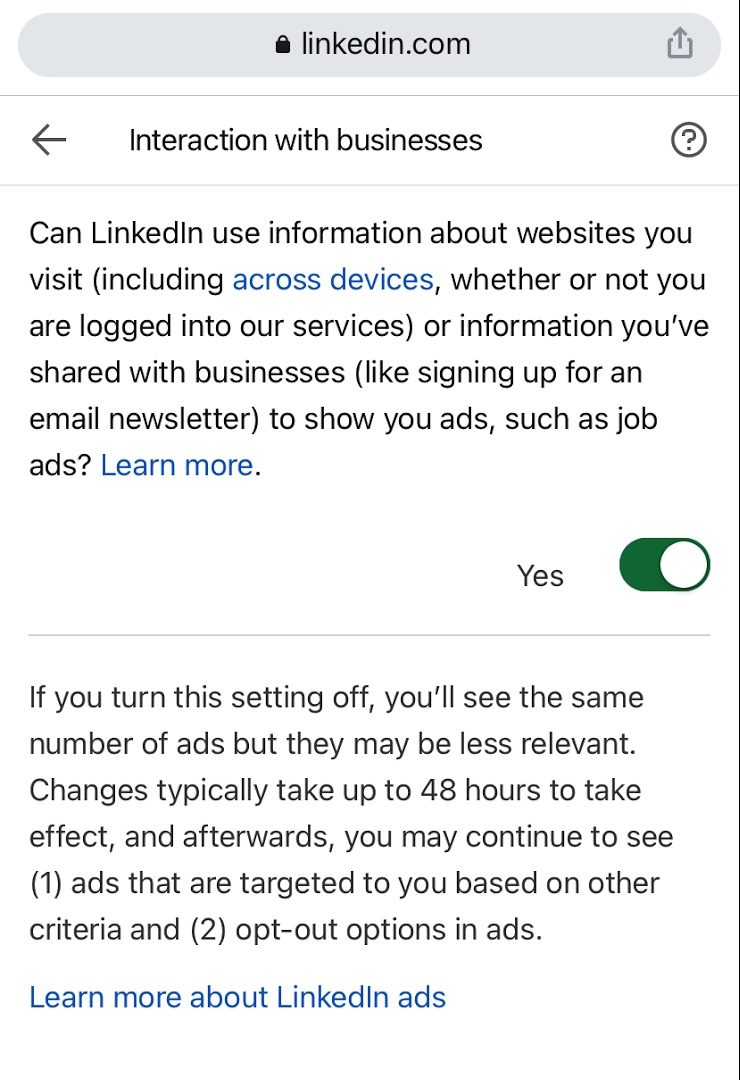
Image 1- Actual screen shot of LinkedIn third-party cookies set up shows that they can track you “across devices, whether or not you are logged in”. I only got this option when I connected to the UK. More on this later.
The other way they cosy up is through tracking pixels or web beacons. Most consumers don’t even know about this cyber evil. I learnt about this from a friend in digital marketing. A tracking pixel is an invisible image in the emails you get, and it will tell the sender if you have opened the email or not and then share your location. My marketing friend argues that this helps them measure the success of their marketing campaign. But just the fact that they can use this without my knowledge and get my location is a frightening proposition. Imagine the damage this could do in the wrong hands. Arguably, a perfect stranger can use this trick to determine whether someone is at home or away on holiday. (You can disable downloading images on your emails to stop tracking pixels). These tracking pixels track all visitors’ activities on a website, and measure the conversion rate (from a visitor to a paying customer).
The third method of getting to know you is through browser and device fingerprinting. If being tracked by cookies and invisible pixels annoys you, meet its more annoying relative. Fingerprinting in tech language is a way of identifying users based on what your device or browser information is giving away when you go online. Fingerprinting was initially used for cybersecurity purposes helping websites prevent fraudulent activity and software piracy.
However, it takes more effort to collect and compare these pieces of information to create an accurate profile about you. Nevertheless, this technique can successfully identify users 99 per cent of the time and worth the trouble. So even if you did your cookie hygiene ritual, including private browsing with Brave or Tor, this technique will evade that and then identify you again and ‘re-cookie’ you.
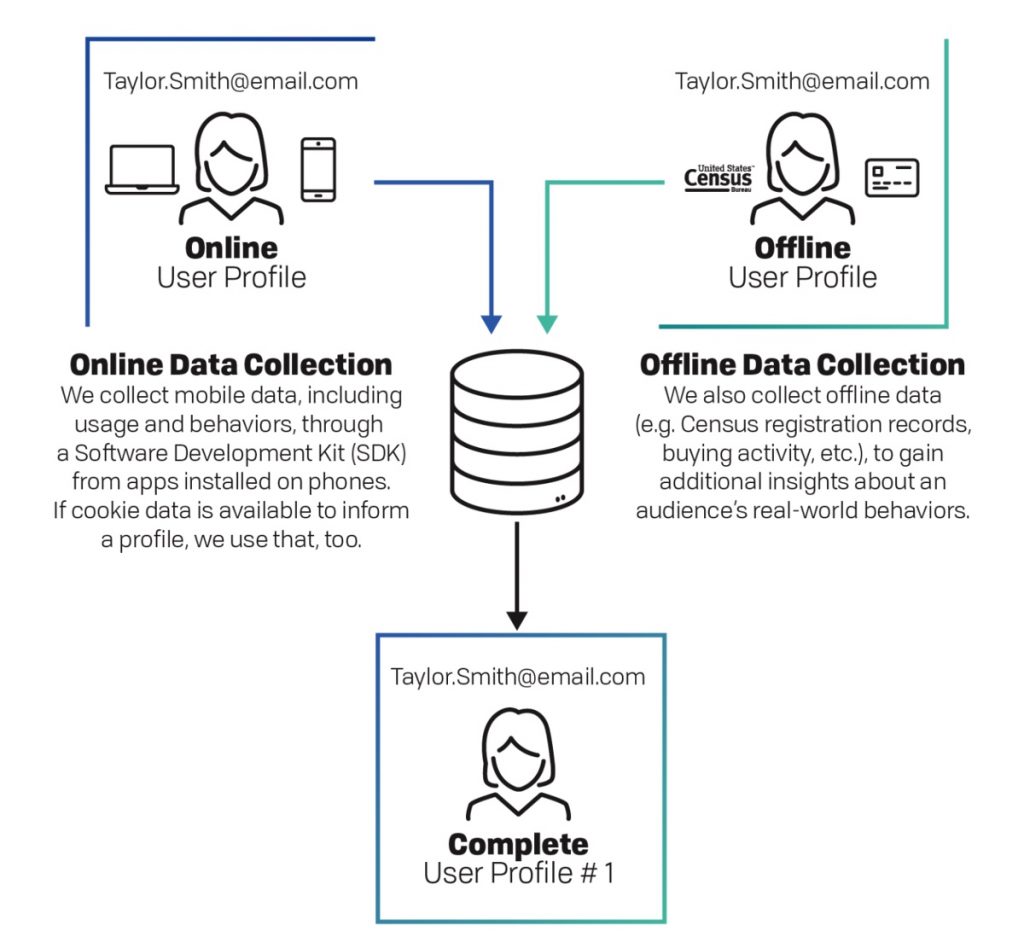
Image 2 – Screenshot for a digital marketing company. Even if your information is anonymised before selling, data sets comparison makes it easy to match that information with your name and address. Source
The fourth method of finding out more about you is algorithms. With a large amount of information shared every minute online, algorithms come to sort this information and serve us what the algorithm thinks will keep us engaged and interested. The more we are online, the more we train these algorithms. Algorithms learn and adjust, can be altered and tweaked, and can become complicated and mysterious, even when they become too much for the creator.
There is a fifth method, but I’ll leave it for you to name. It’s the mysterious way Big Tech collects the most personal information about you through the devices you have while you are not using them.The spying Alexa and Google Assistant, even Google’s Pixel, are a few examples. (Are you, too, thinking that “Orwell’s Nightmare” can be a suitable name for this method?)
In 2015, Carnegie Mellon University conducted a research to find out how much data is shared by our phones. 23 users of Android smartphones participated in the study. The results were unsettling. Many popular Android apps tracked their users nearly 6,200 times per participant over two weeks – that’s every three minutes. The study found that apps asked for more data than was needed. One participant said he felt like he was being followed by his own phone.
Android is made and owned by google. Today we have over 2.5 billion people using Android. Android devices don’t only share location with Google and the rest, but all users’ behaviour and how they use their phone is also shared. Things like mobile carrier, battery level, volume settings, alarm clock data, even how you type down your contacts information.
So much of our lives and personalities can be extracted from how we use our phones. Our phones are just an extension of who we are. There are companies today that have made a whole business out of analysing such behavioural data and selling that to lenders. Those companies can analyse users’ personalities through their phone usage and decide who is trustworthy of a loan and how much interest they should be charged. one example, if your phone battery is always low, that means you don’t plan ahead and you are unlikely to pay your debt. Other things like the way you save your contacts. If you just save the first name without capitalising the first letter or adding a last name, then your trustworthiness of a loan is minimised.
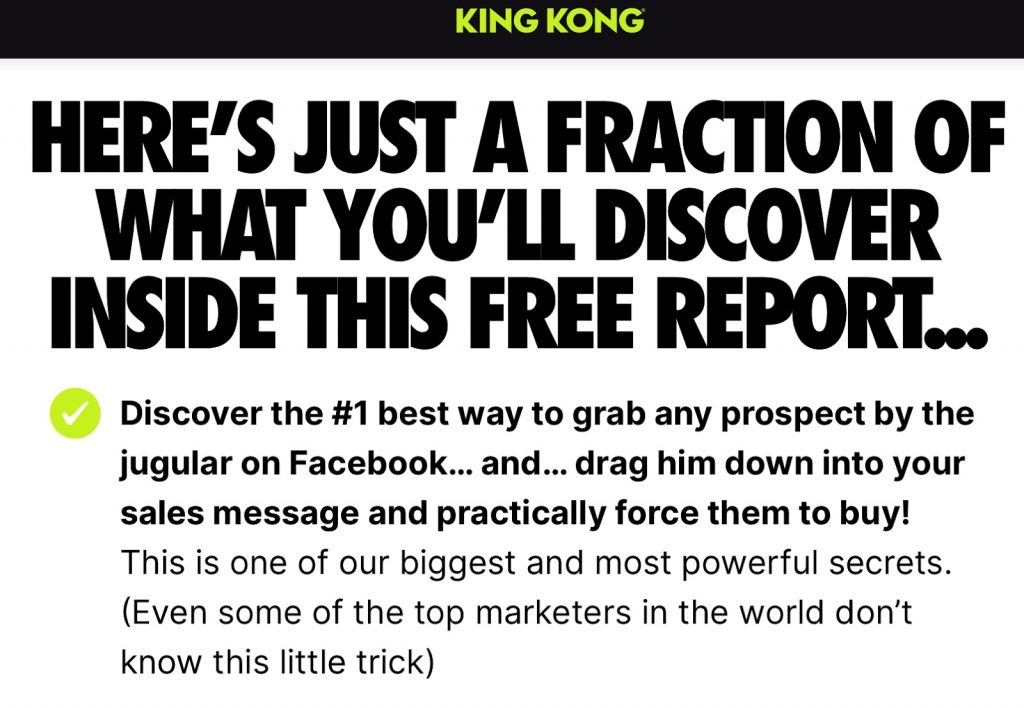
Image 3- A message from a digital marketing company to its potential advertisers. Source
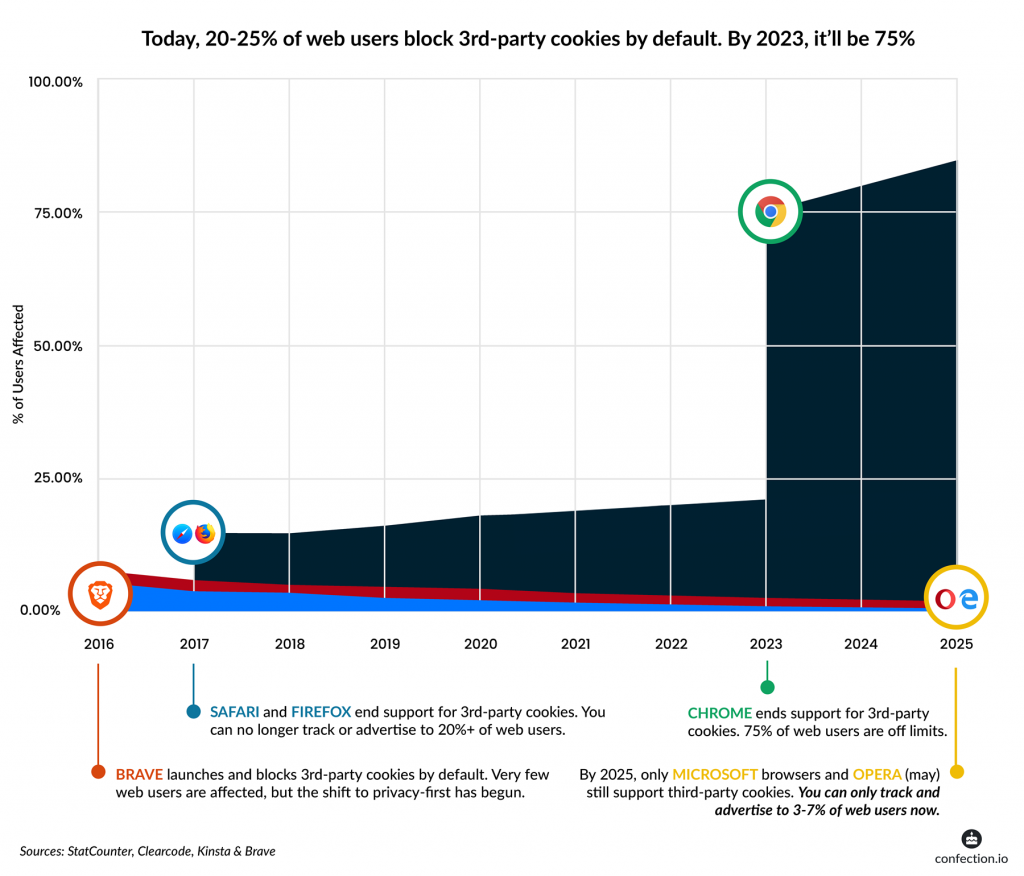
Image 4 – A service for tracking pixels concerned about all those browsers blocking cookies, tracking pixels and trackers. Source
Our phones, our masters
Sean Parker, ex-Facebook president, warned that Facebook “literally changes your relationship with society, with each other. It probably interferes with productivity in weird ways. God only knows what it’s doing to our children’s brains.” In his own words, he said they wanted to know “How do we consume as much of your time and conscious attention as possible?” He went on to lament that we are all “jacked into this system, all of our minds can be hijacked. Our choices are not as free as we think they are”.
The targeted advertising platforms don’t only want our data, buy our data from data brokers, and analyse and predict our every move and mood; they also want us to spend our lives online. “According to a 2016 study, we touch our phones around 2617 times a day, while another study showed that 79 percent of phone owners check their device within 15 minutes of waking up” (Rana Foroohar, Don’t Be Evil, p. 27). Our attention has been hijacked so much that one out of every four car accidents in the United States is caused by texting and driving. As a result, we have shorter attention spans, take our phones everywhere, and become anxious if it’s out of sight.
Tristan Harris, a former Google employee, exposed the persuasive techniques Big Tech uses by engineering apps to give us doses of dopamine like a slot machine in our pockets. All to keep us hooked and coming for more. “Technology steers what 2 billion people are thinking and believing every day…Religions and governments don’t have that much influence … But we have three technology companies who have this system that frankly they don’t even have control over…which is governing what people do with their time and what they’re looking at.” Harris warned.
Moreover, Big Tech trains us to underplay the importance of privacy; after all, what is there to fear if we have nothing to hide? They give us a map to get us to our destination faster and record every place we have been to. (Google doesn’t offer the option to stop storing location history, it can only be paused, and it doesn’t say how long it will pause the tracking).
Being in a constant state of surveillance creates nothing but a complacent society, afraid of expressing their thoughts. To realise that every move is being monitored and analysed, our curiosity to search, learn and engage in discussions for healthier societies is jeopardised.
Facebook’s guinea pigs
It’s no understatement to say that once you click ‘accept’ on the Facebook Data Use Policy, you sign up for a mass psychological experiment. This policy states that Facebook “may use the information we receive about you … for internal operations, including … research”. They might not be a research institute, but they have your consent, data and are indemnified.
In 2012, Facebook ran a mass psychological experiment on 689,003 randomly selected Facebook users, who were divided into two groups. Facebook elected to show only negative content to the first group for a week while showing only positive content to the second. They monitored each group’s behaviour. Two years later, the results were published and not surprisingly concluded: “When positive expressions were reduced, people produced fewer positive posts and more negative posts; when negative expressions were reduced, the opposite pattern occurred. These results indicate that emotions expressed by others on Facebook influence our own emotions, constituting experimental evidence for massive-scale contagion via social networks”.
In other words, our moods and behaviours can be influenced by our online interactions, which can be controlled by whoever runs the algorithms responsible for what newsfeed we read and what targeted advertising we see. This experiment was done without the user’s consent, didn’t allow them to opt-out, and didn’t have the approval of an ethics board like any other experiment involving humans.
Today, data mining and hyper-targeted advertising is the most profitable business model in the world. Facebook generated $84.2 billion USD in advertising revenue in 2020, making it one of the largest digital ad players in the U.S. and globally. And Big Tech will do everything to protect this lucrative business model, even fraud. There is an ongoing class action lawsuit against FACEBOOK, which was originally filed in 2018 by a small business owner, that claims Facebook inflated metrics to boost ad revenue. According to the lawsuit, Facebook’s senior executives knew for years that its “potential reach” function was inflated and misleading, but that they failed to act and actively tried to conceal the issues.
A new report from Influencemap shows that in 2020, oil and gas companies paid at least 9.5 Million USD to Facebook in the USA to mislead people about the role of oil and gas on climate change. Facebook advertisements of the sector designed to prolong the use of fossil fuels were viewed at least 431 million times during 2020. 48% of these ads highlighted that the fossil fuel sector was ‘part of the solution’ to the climate crisis. 12,140 ads in this category were viewed 122 million times, with younger users (25-34 years old) more likely to be in the target audience.

Image 5- In May, Signal messaging app demonstrated what information Facebook share with their advertisers. Source
Can we fight back?
“If you dislike the idea of living in a digital dictatorship… then the most important contribution you can make is to find ways to prevent too much data from being concentrated in too few hands… These will not be easy tasks. But achieving them may be the best safeguard of democracy” – Yuval Noah Harari
The simple answer is that we can’t, unless we go back to your 1997 Nokia or completely go off the grid. Once we go online, nothing is private. Apart from minimising the harm by making informed clicks, and even this will consume tens of hours of our lives with every page we read, and many times we need a legal advisor to understand to give an informed consent.
Our best hope now is to spread as much awareness as possible and expose these shady and unethical ways of tracking and profiling us.
Nonetheless, these are some simple strategies to evade online tracking:
- Use Search engines that won’t save every search you make, like DuckDuckGo.
- Remove invasive privacy apps from your phone like Facebook, Tik Tok and the like (Apple Store offers Privacy Report on popular apps before downloading).
- Use private browsers like Tor, Brave and Safari.
- Reject all non-essential cookies when visiting websites.
- Create an online persona to sign up for services and mailing lists. Use ad-blocker and Privacy Badger while browsing.
Still, none of these ways will evade the fingerprinting technique.
In acknowledgment of the invasive nature of cookies, the EU’s General Data Protection Regulation or GDPR class cookies as “online identifiers”, subject to regulations that require websites to gain your consent before issuing cookies to your browser. So one way to enjoy better privacy rights is to use a VPN service to browse as if you are coming from the EU. This will make any website think you are protected and shows you the “We respect your privacy” option to opt out. (California has better privacy laws too).
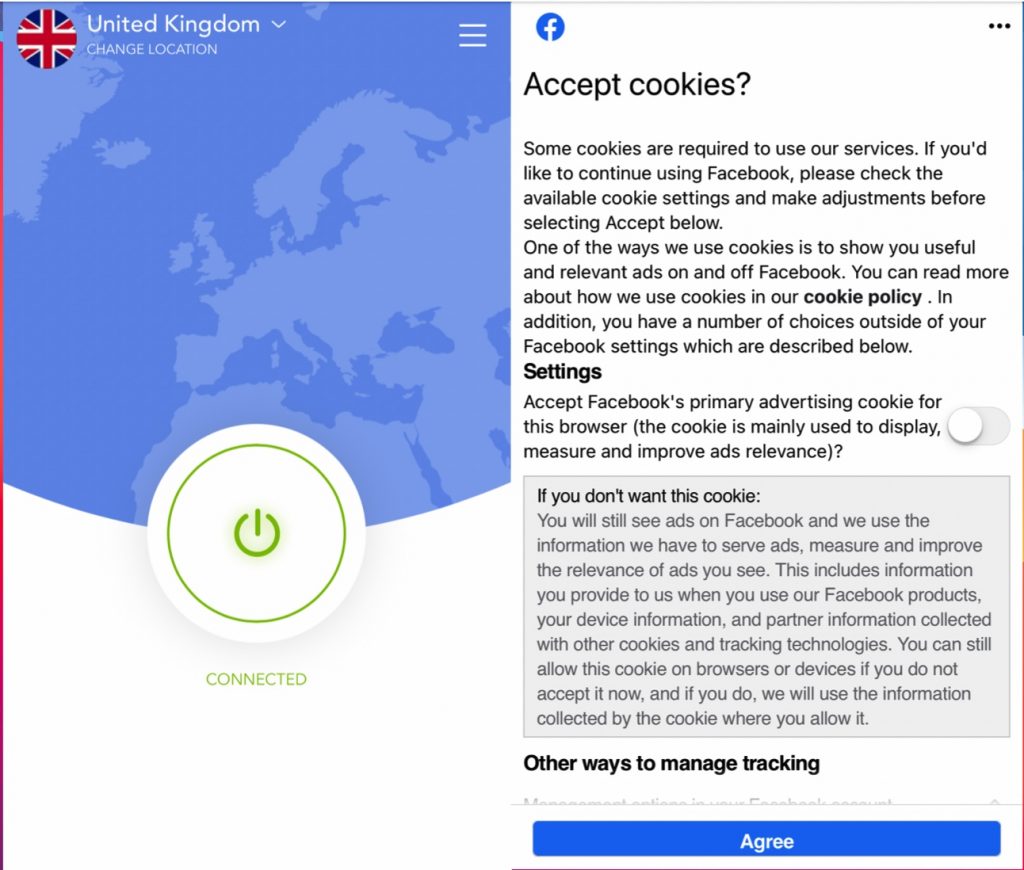
Image 6 – Facebook and everyone else show their “We value your privacy” message and option to opt-out when connected to a country with strong digital privacy laws. You won’t see these options if you are connected from Australia.
Where to next?
Professor Zuboff states that surveillance capitalism is “an assault on human autonomy” What began as targeted advertising is now a threat to freedom and democracy. “Instead of behavioural modification for commercial ends, the ends become political. Voting instead of buying”. It is the time to wake up and fight back in the act of digital self-defence.
It’s worth knowing that not only advertisers are after our profiles, our potential employer, our health insurance provider, law enforcement agencies, authoritarian regimes, corrupt politicians and pretty much anyone who can pay the price to get access to our profiles, would do.
Zuboff’s nightmare of democracies manipulation was realised, but only after the damage was done. In 2019, the American Federal Trade Commission (FTC) hit Facebook with the most significant privacy violation penalty in the history of the trade commission. The FTC fine of $US5 billion was issued in the wake of consulting firm Cambridge Analytica having access to the information and micro-target of more than 87 million Facebook users, which was used to interfere with the US presidential elections. Cambridge Analytica uses big data analysis and a process called psychometric targeting to change audience behaviour. The results are astonishing and almost guaranteed. Cambridge Analytica’s involvement in Brexit is another known example of the power of this method. But unfortunately, what’s hidden may even be worse.
The Norwegian Consumer Council recently published a report calling for a ban on surveillance-based advertising, arguing that the harms outweigh the benefits, which usually go to a few hands in Silicon Valley. The report mentions that the industry has shown little desire to abandon its questionable practices despite repeated warnings, hefty fines, scandals and revelations. Thus, the last resort is a full ban.
The report argues that successful alternatives to this unethical surveillance-based advertising exist. “The New York Times stopped serving surveillance-based advertising to European users; its advertising revenue kept growing as its advertising partners purchased ad space regardless of the targeting capabilities” the report noted.
The business model on which this industry is built is at its best unregulated and at its worst deteriorating the fabric of democracies. As progressive governments don’t wish to obstruct innovation and technological advancement, they give those tech companies the luxury of operating unregulated. Sometimes, it can be due to governments not keeping up with the speed of the tech world. I join the Norwegian’s call for people to learn and exercise their digital rights and demand the policymakers to ban this invasive and unethical surveillance-based advertising.
Apart from all that, what we need is for our governments to create regulatory bodies to monitor highly manipulative, highly addictive technology the same way they regulate drugs and tobacco. And maybe teach ethics to computer scientists and engineers in universities. Quite simply, our mental health, human experience and liberties are not for sale.
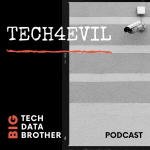

1 comment on “Targeted Advertising or Surveillance-Based Advertising?”